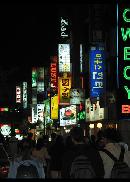 Been a long time since I rolled with the Rice Daddy crew, something for which I apologize to my fellow R-Pops—but there's so much great stuff going on here that I'm sure my minor contribs were scarcely missed.
Been a long time since I rolled with the Rice Daddy crew, something for which I apologize to my fellow R-Pops—but there's so much great stuff going on here that I'm sure my minor contribs were scarcely missed.That said, my most recent column at SFGate was occasioned by the release of the annual "Sexiest Man Alive" issue of People magazine, which included the usual suspects (e.g. George Clooney, who was dubbed the year's most delicious living dude for the second time, joining Brad Pitt and Richard Gere as the only such double dippers).
So here's the thing: In 21 years of crowning kings of schwing, there's been just one nonwhite honoree: Denzel Washington. Is this something that should bug us? Or is this even a question we need to be asking at this point in our collective cultural lives?
Daddy in a Strange Land shared his opinion to me that even raising the discussion essentially buys into the troubling notion that worth is related to attractiveness: "I'm not naive and I'm not living in a cave somewhere, I know that that's the real world, but as an anti-racist, feminist father of color married to a woman of color and raising a daughter of color, I have to ask, are we asking the right questions, challenging the right definitions?"
Which I certainly agree with. But as much as I want to reframe attractiveness according to a different set of criteria (like, it wouldn't suck if "slightly chubby 38-year-old men with glasses, goofy hair, and mediocre fashion sense" became the new gold standard for masculinity), we deal with this kind of thing every day.
There are real consequences—as Ingrid Olson of the University of Pennsylvania found in a gloom-inducing experiment earlier this year, attractive people get associated with positive traits that lead to better treatment. And this was born out in a study by a team from Harvard and Wesleyan: good-looking people are perceived to be more productive and better hires. (Why top-tier liberal arts colleges are spending so much time and money researching hotness is a whole 'nother question...)
Which explains in part why, consciously or not, we pride in having our boys, girls, and babies dubbed cute by others—there are real utilitarian consequences to cuteness. My son is billions of times cuter than I am (or was at his age), and I light up every time I hear someone compliment him on his cute-osity. People can come up to me and say, "Dude, you reek, but your son is gorgeous," and I'll flash a huge grin and thank them (and credit Hudson's mom with the hottie genes, of course).
Is it icky to think this way? Kind of. I mean, it's bad enough that I'm feeling all of those cliche, suffocating Asian parent academic agenda items starting to float into my forebrain—Is he hitting all of his developmental milestones? When should we start him on violin? SATs—study now, or wait until he's four?—but I also find myself wanting him to be the suave, athletic, toe-curlingly good-looking guy that I never was, or aspired to be.
And yeah, I hope we get to a point in our reality where attractiveness isn't just a set of washboard abs or a sculpted set of cheekbones. (Thus, my campaign to push Masi Oka to the top of People's "hottest Heroes castmember" poll—little victories still count for something.)
But the reality of what physical appeal means in our society is still out there. Which means there is meaning, however shallow it seems, in getting society to recognize our particular looks, features, and distinguishing characteristics as part of its benchmark for beauty.
For the record, however, the Rice Daddies I've been lucky enough to meet are as impressive a buffet of smokin' male hotness as I've ever seen. And the kids? Peep the pics for yourself. So cute, you could just die.




